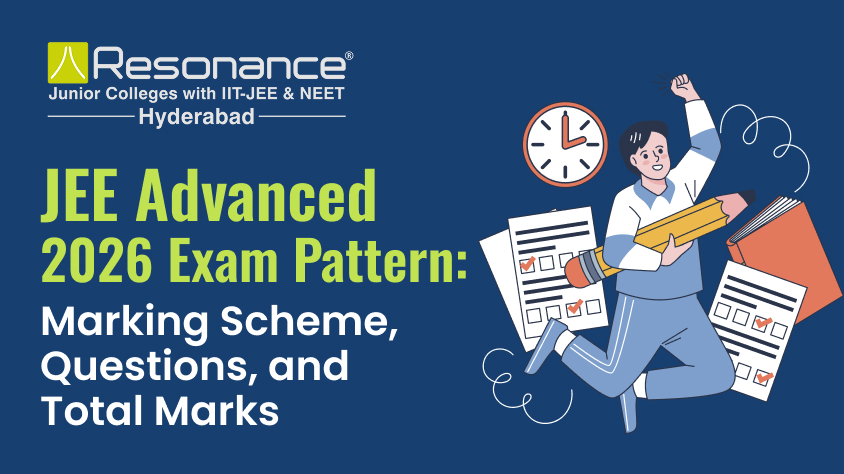- Resonance
- 241 Views
JEE Advanced 2026: Smart Time Plan to Ace Every Subject

Earning eligibility for an undergraduate degree from a prestigious technological institution in India, such as IIT, is a difficult task but never impossible. You too can achieve your dream course in reality, provided you study as per the prerequisites. You can succeed in your desired undergraduate course not just by passion or hours of study, but the preparations should be steady. Although you put in extreme efforts, you may still experience failure due to improper preparation. The only way to succeed is to adapt the correct learning methodology, and the inclusive smart study can produce fruitful results. If you are serious about JEE Advanced or a repeater, you can hit your goal by making the appropriate moves while preparing for the national-level competition.
In the lines below, you can find JEE Advanced Preparation tips that will facilitate your preparation, whether you are attempting for the first time or are a repeater. The lines accurately describe the exam pattern, including the types of questions and the negative marks for incorrectly attempted questions. This phase of the description tells you the sensitivity of the exam and how sensitive you are expected to be in the examination hall.
The second phase of the blog helps you explore the subjective toughness and essential tips to eliminate wrongdoing while you are in preparation mode.
The third phase enables you to understand the significance of time management and the significant factors that you must ‘never forgo’ in due JEE advanced preparation.
JEE Advanced Preparation Exam Pattern and Marks Deductions in Paper 1 & 2 for 2026
The qualified candidates in JEE Mains are permitted to participate in the IIT examination a few months later. The examination comprises papers 1 and 2 in morning and afternoon sessions. Each JEE Advanced Preparation paper has a specific question format and has key characteristics.
Marks Allotment for Question Pattern:
If you commit a mistake by marking incorrect answers, then, depending on the question format, marks shall be deducted accordingly.
It may be minus 1 or 2, depending on the pattern of questions.
If the answer is correct, you will be awarded +3 or +4, and, for unattempted questions, zero marks will be awarded or deducted, which means the scores will be neutral.
Certain question types will not have mark deductions for incorrect answers.
If you mark a wrong answer for NAT/Matrix questions, negative marks will not be awarded.
Question format Type :
The JEE Advanced paper comprises four types of question formats, such as match the pairs/matrix-based, numerical answer type, NAT, assertion-reason/paragraph type, and multiple-choice questions (MCQs). Each question format has a specific property, and they are as follows:
In matrix-type questions, the questions are conceptual and the linking is between entities described in two columnwise parameters.
In numerical answer type, NAT, questions, you must solve the problem and enter the numerical value.
In multiple-choice type questions, MCQs, one or more answers may be correct, and you will have to identify the given answer options.
In assertion-reason or paragraph questions, the question can link multiple concepts. These types of questions are rarely given in question papers.
JEE Advanced Preparation Tips for First/Second Attempt
JEE Advanced Preparation Tips alone will never enable you to succeed. It will require sheer determination, consistent hard work, and a positive mindset throughout. Your two-year long-term preparation involves ups and downs in your learning process, and your mentor would advocate for solving the tricky and complex problems.
Several important entities should be put to work while preparing for these national-level competitive exams, and the learning process delves into self-study, planned and tailored to your convenience. JEE Advanced covers a huge syllabus, and therefore, before you reach the exam table, you must be thorough with concepts, formulas, and be able to solve different question formats in an error-free way. This is made possible if you follow a set of procedures, checks, and counterchecks while preparing for these competitive exams.
All Subjects in JEE Preparation Should be viewed alike.
Here are a few tested and proven methods that can prove beneficial while you begin your preparations.
Step 01
All three subjects, physics, chemistry, and mathematics, are equally important for scoring, and therefore, you should never ignore any subject. Some of the important aspects you must maintain uniformity in preparing are as follows:
For questions that involve using a formula, you must remember it and apply it at an instance without making a delay. For that, you must have the formulas at your fingertips. A continual practice of memorizing formulas is essential, and make a list of important ones.
Memorising topics of chapters in a subject alone doesn’t get you into the columns of top scorers. You must practice to reduce the errors. And the process is illustrated below.
At the end of every week, you must practice the questions that are covered in the examination paper and do it ritualistically. Weekly test evaluations will help you correct the errors made in solving the problems. From the beginning, when you practice, it will enable you to plan question-solving techniques. You will be able to spend appropriate time and develop technique when you continue or skip attempting a problem. Your discipline in solving questions should continue until the end, where solving full-length mock tests will give you complete control over the examination paper.
Benefits of Solving Mock test papers in the long run:
Repeatedly solving mock tests can lead to an error reduction through consistent practice, and the ultimate benefit is to improve your time and accuracy.
It helps you concentrate on weaker topics and perfect the tougher ones.
In exams, employing smart tricks and shortcuts will help you spend more time on tough questions due to the limited time available in the exam.
Important topics in Mathematics, Physics, & Chemistry
Every subject contains important topics, and those questions must be perfected for better scores.
You must identify the high-priority topics and perfect them without skipping.
Every subject has high-priority topics, and you can get a preview of them.
Mathematics:
To solve complex problems, you must master complex problems, and this is made possible by learning the fundamentals of algebra, coordinate geometry, and calculus.
Below are the weightages you must never skip to master the fundamentals of these topics.
Algebra ( Quadratic, Complex) ( 10% - 12%)
Calculus ( limits to differentiation) ( 25% - 30%)
Physics:
To master problems, you must understand the fundamental concepts thoroughly. It will enable you to solve the toughest problem easily.
In General Physics, Units and Dimensions, Measurement, Errors. Mechanics: Laws of Motion, Rotational Motion, Gravitation. In case of Thermal Physics: Thermodynamics, Heat Transfer, and for Electricity and Magnetism: Electrostatics, Current Electricity, Magnetic Effects.
Below are the weightages you must never skip to master the fundamentals of these topics.
Mechanics - weightage 25-30%
Electrostatics & Capacitance 6-8%
Current Electricity 5-6%
Optics - 10%
Chemistry:
To give your best in chemistry, you must remember that the NCERT books are most important, and later you must concentrate on the high-weightage topics as mentioned below.
physics chemistry (thermo, equil) (10% - 12%) weightage
Inorganic ( NCERT-based) 12% - 14%)
Coordination Chemistry (6% to 8%)
Organic Reaction Mechanisms ( 10% - 12%)
Time Management in JEE Advanced Exam Draws You Closer to Success
The JEE Advanced Exam requires a well-planned attempt that demands better time management techniques to be employed.
Practicing mock tests will help you create a perfect plan depending on the toughness of the main question paper.
Depending on the pattern of papers 1 & 2, you will be subjected to a 3-hour paper; Each paper comprises 3 sections, which means you will have to allot 1 hr for each subject.
Your mock test practice shall enable you to create an instant strategy for solving the main exam papers.
Attempt your favorite Subject First:
Choose your favorite subject and complete it in the stipulated time. It can build confidence when you begin to answer the remaining subjects.
Most Important Issue:
Read the instructions carefully, and check for the marking scheme related to negative marking. You may find some new inclusions or deletions in the rules of the exam. Hence, reading the instructions carefully is a must.
Make it a daily routine while preparing for JEE Advanced 2026. If so, what are they?
Time Management: Subject-wise for Papers 1 & 2
When preparing for the JEE Advanced 2026, maintain a proper healthy mindset and physical well-being until your preparations for papers 1 and 2 are complete.
Organise Your Study Material:
The time gap between the JEE Mains and JEE Advanced is hardly a few weeks, and you may be unable to make multiple revisions.
For final revisions, keep your material intact and maintain specific timing for covering your study material.
Do not begin new learning, but practice what you have done repeatedly until your exams are complete in JEE 2026.
Health Conditions:
You must keep track of your mental health and physical health from day 1 of your JEE preparations. You should consume nutritious food and get a good night's sleep daily.
Seek help from Mentors:
Time is precious. Get your queries sorted with mentors early. Otherwise, you will end up making big mistakes at a later stage.
Be Positive, think Positive:
You must seek your mentor's advice and follow such advice univocally, unwaveringly, with confidence, and maintain a steady discipline.
Take a Break from Preparation Now and Then:
Concentrate on your study material, but take regular breaks by keeping to the time interval. now and then.
The break duration depends on your ability to restore calmness, which helps you generate productive output.
Conclusion:
JEE Advanced is a national-level competitive exam that requires high-level JEE Advanced preparation, and the examination papers involve conceptual problems. To get qualified in IITs, you should establish a well-planned strategy and execute better time management techniques, in fact, the most important JEE Advanced preparation tips. Each of the papers needs a balanced study, and you can find ample suggestions to achieve your dream goal and succeed.
JEE Advanced Preparation Tips
FAQ: Essentials of Time Management for JEE 2026 Preparation Tips
Q: Can you recommend time management techniques during JEE Advanced Exams?
Remember, the JEE Advanced is a national-level platform that requires consistent study from the first day onwards. Yet, you must bear in mind never to exert pressure on yourself while preparing for the examination.
Keep your study time short and simple as you draw closer to the exam day. You must maintain a well-balanced study and sleep schedule. At the same time, you must make revisions and practice important complex solutions by taking into account the expected time limit for solving them. Your speed and accuracy in the exam can only be perfected by consistent practice of mock tests.
What is the optimum preparation time for JEE Advanced?
The optimum period differs from individual to individual, and for JEE Advanced, the minimum period can be from 6 to 10 months. Experts say the best period to begin for JEE Advanced is when you are in Class 11.
If you identify yourself as weak in concepts but still dream of achieving your dream career, then you should start your preparations two years before the commencement of the JEE Advanced exam. A time that would take strengthening your concept-building skills, practice, and well-structured revisions.
Q: How to manage time when preparing for JEE Mains and JEE Advanced at the same time?
When preparing for the JEE Main and JEE Advanced, your initial preparation shouldn’t bother you.
The syllabus for JEE Advanced demands more references on important topics, and the questions are based on conceptual fundamentals.
From the beginning, attempt questions from mock tests, be strict in maintaining a correct schedule of study material, and continue it without a break until your goal is reached.
You must be clear to realise that you will be left with a few months between JEE Mains and JEE Advanced, so you must have done everything and keep yourself free from serious preparations. Be cool and just stay committed to revisions.
In what way do JEE Mains and JEE Advanced differ in syllabus?
The syllabus for JEE Mains and JEE Advanced looks the same. It contains the Classes 11 and 12 syllabus, yet they are dissimilar.
In the JEE Advanced syllabus, you will have to delve deeply into the essential topics than usual. The questions given from the syllabus will require a deeper understanding of the concepts.
Can I seek the best strategy for JEE Advanced 2026?
You should conduct a smart study for JEE Advanced 2026 that includes the following features.
Develop a strong understanding of concepts.
Stick to a well-planned study routine.
Practice as many problems as possible for perfection.
Practice mock tests by setting an exam environment to overcome the fear of failure, and also develop the habit of allotting the time appropriately to answer every type of question.
Q: How different is JEE Main preparation from JEE 2026? Does JEE Advanced demand additional preparations?
The JEE 2026 exam paper is built on the conceptual knowledge of the subject topics, and you will have to memorise many formulas as they are put to application.
When compared to JEE Advanced, the Mains paper is simpler and doesn’t focus much on conceptual analytics. In case of JEE Mains, the questions are simple and direct to solve, while in JEE Advanced, the questions are tricky and confuse your intellect.
How much time should be devoted to preparing for JEE Advanced 2026?
You must follow the expert advice or the tips from the toppers in JEE Advanced, and they say, 12 hours of study every day should do for a few months before the exam.
Remember, you must adapt to quality preparation that includes adequate breaks, well-planned study sessions, and revisions.


Recent Posts
Learn from Legends – Inspiring Holistic Growth for Young Resonites
September Sat,2025
JEE Advanced 2026: Exam Pattern, Marking Scheme, Questions & Total Mar
September Tue,2025
Why Resonance e-Learning App is the Best Choice for IIT-JEE & NEET Prep
September Mon,2025
Class 12 Students Smart Strategies for JEE and NEET Preparation
August Tue,2025











